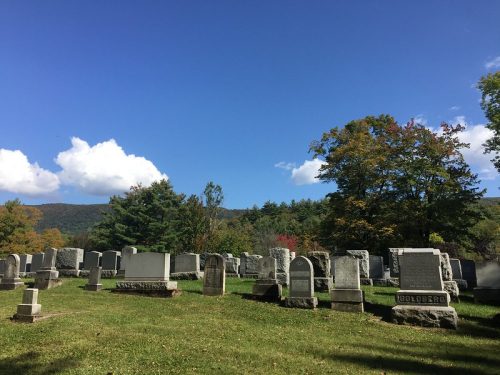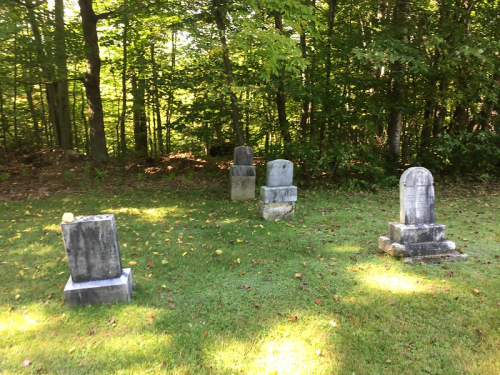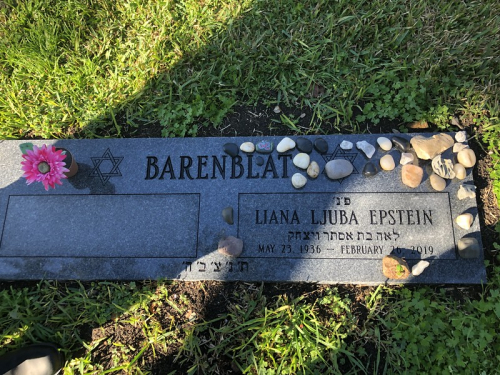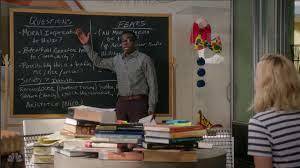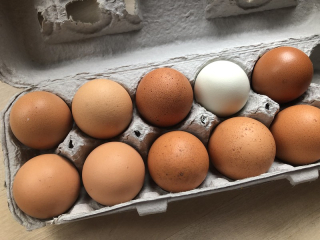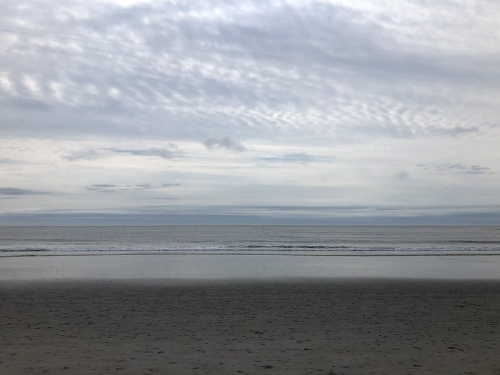Rachel Barenblat's Blog, page 34
August 29, 2021
Paying respects
Synagogue cemetery.
Fewer people come to the cemetery service each year. When I began serving this community, ten years ago, we would have at least a dozen. We'd set up a circle of folding chair and pray the afternoon service. And then people would take pebbles and quietly walk through the cemetery, leaving stones to mark their visits to parents or grandparents or great-grandparents. Some members of my shul are fourth or fifth generation; they have ancestors to visit here.
Older stones.
These days only a few people come. Many of those who used to attend the cemetery service each year are now buried in that same cemetery. I like to think that I am still davening with them each year when we convene on a Sunday before Rosh Hashanah. There was one gentleman who always used to come to the cemetery service and then quip, "Rabbi, don't forget, you're doing my funeral!" And I'd always say, "No time soon, please."
Mom's grave. San Antonio.
The custom of visiting our ancestors at the cemetery before the new year feels old-fashioned. It comes from a time when people didn't migrate much. Today most of the members of my small shul are not fourth- or fifth-generation members. They're transplants, like me. I've been here now for almost thirty years (and have served as the rabbi here for a decade.) This is my home, and my son's home. But our beloved dead aren't here.
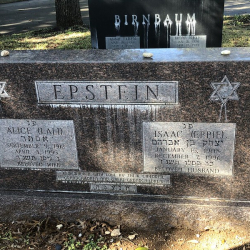
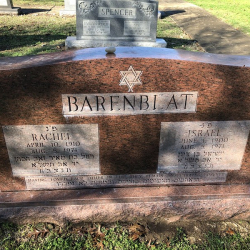
My mother's parents; my father's parents. San Antonio.
My mother and my grandparents are buried in San Antonio. For great-grandparents, I'd have to cross an ocean. In 1993, we visited Prague (my grandmother's and my mother's birthplace) and we went to see my great-grandparents in the "new" Jewish cemetery from the 1800s. I remember my grandmother's satisfaction at being able to visit her parents' graves again. She told us how they used to picnic there with the ancestors on Sundays.
My grandmother and aunt at my great-grandparents' graves. "New" Jewish cemetery, Prague, 1993.
It feels right to pay our respects to the dead before beginning the new year. To remember that one day we too will return to our Source. This afternoon I will hold a smooth pebble in my hand and I will think of my beloved dead. I'll think of them too when I make challah before the new year: round, like the year, and studded with raisins for sweetness. Their headstones are far away, but their presence is as near as memory.
August 13, 2021
A week of building with Bayit
Top row: T-shirts courtesy of Steve Silbert; the Bayit Board meets onsite and online; kayaking on the lake.
Bottom row: morning davening gear, and our morning davening spot.
When we gather at our VRBO, the first thing we do is kasher the kitchen. We do a massive grocery run at a nearby kosher market and make dinner together. We turn a pile of inspirational stickers into impromptu mad libs. On Rosh Chodesh Elul we daven outside under the spreading trees and the fields of goldenrod and corn, and we sing and laugh our way through Hallel.
We blue-sky dream about what we want Bayit to be and do next. We talk about disruption, innovation, collaboration and creativity, inspiration and design, remix and joy. We talk about Jewish life and what what people need (especially now, amidst pandemic and change). We talk about spiritual tools and technologies, ritual and learning, knowledge and practice.
We talk about problem statements, and use cases, and minimum viable products, and how to know when a new idea "works," and the cycle of trying a new thing, measuring success, revising the thing, trying again. We brainstorm lists of people outside this room whose work we want to uplift, and talk about how to do that. We sing niggunim. We add cards to Trello boards.
We talk about audiences for our offerings / who we serve. We talk about restorative religion and DIY religion and social justice. We talk about ethics, and pluralism, and collaborative creativity and why the collaborative process matters to us, and about bridging between silos and between communities. We talk about our collective strengths and competencies and what we love.
We review our portfolio of existing and possible build projects. We review the builds that are already underway, books and classes and ethics work and liturgy-poetry-art offerings. We let some ideas go. We write down new ideas that are flowing now that we're together -- some of us onsite, some of us on Zoom -- as we talk timelines, workflows, skillsets, middot / qualities.
We sit at the kitchen counter with coffee and we workshop poetry and liturgy, reading lines aloud and offering suggestions, tinkering and uplifting. Over dinner we toss sermon ideas around. We share High Holiday planning. We look at Bayit's mission and vision, and choose which build projects to prioritize. We dream together about collaborations, set new ideas in motion.
In between these conversations we cook meals together. We kayak on a nearby lake. We study the Me'or Eynayim. We sing with guitars by the firepit and I marvel at the miracle that we are here together again, learning and hoping and building. We are rebooting Bayit together, retooling for who we're becoming and for the different needs that the pandemic has revealed.
On Friday we daven with guitar, riffing melodies, singing in harmony, laughing, reaching out to God with supplication and joy. The birds flit from one goldenrod stalk to another. The big maples grace us with occasional raindrops. The crickets and cicadas sing with us. We close with every Psalm 27 melody we know before blowing shofar. The sound rings out over the fields.
At the end of the week we make Shabbes. We gather with guitars by the lake, we daven and harmonize, we sing and rejoice. We take a day to rest and renew -- though honestly, for me, this whole week has been restorative and renewing, even though we got so much done. To have the opportunity to build for the future with such extraordinary hevre: I am blessed beyond measure.
Bayit board, onsite and online.
Cross-posted to Builders Blog, with endless gratitude to the Bayit Board and to all who build with us.

August 8, 2021
Anew

Here’s the thing: the year begins anew
even in the worst of times. The leaves
will turn and fall and then they’ll grow again.
And sometimes we’re afraid, and we can’t know
what choice to make to keep anyone safe.
Uncertainty’s a bear. All we can do
is seek out sweetness everywhere we may
and work to fix what brokenness we find.
The good news is we’re not in this alone.
We’ll help each other hope when light seems dim
and lift the sparks that darker days reveal.
We’ll love each other fiercely: in the end
there is no greater work that we can do.
We who survive will help each other heal.
This is the poem I sent to friends and family as an Elul message / new year's card this year. (It's also part of an ad hoc series, along with this sonnet.) You can find all of my new year's poems here.

August 5, 2021
On finding hope amidst despair
I was a writer before I became a rabbi and High Holiday sermons usually come easily to me. Some years I have so many ideas and teachings and hopes to share that I accidentally write more sermons than I need to give.
Not this year. This year I haven’t felt able to begin writing at all.
The enormity of what’s broken in the world feels paralyzing. In recent weeks we’ve seen unprecedented heat and wildfires in the Pacific Northwest, a flaming oil spill turning part of the Gulf of Mexico into an inferno, and extreme flooding across Europe. “Who by fire, who by water,” the words of the Unetaneh Tokef prayer, land differently this year. Dayenu, that could be enough to still my pen — but there’s more.
Last year, leading High Holiday services via Zoom from home, I spoke about our obligation to take care of each other by staying apart. I turned to the rabbi of the Warsaw Ghetto for his teachings about hope during adversity. I imagined Rosh Hashanah 5782: Surely we would be vaccinated and safely back together!...
Read the rest of this essay at JTA: Rabbis Are Supposed to offer Hope at the High Holidays. What if I Can't?
(Spoiler: in the end, I can. Click through and read the whole thing.)

August 4, 2021
Sonnet for our second COVID Rosh Hashanah
I don't want to reckon with my choices:
feels like that's all we've done for 18 months
(should I mask, is this safe, what if
we meet outside and never breathe together?)
I don't want to query who will live
and who will die, who by wildfire and who
by flooded subway, who intubated and alone
and who will have enough while others lack.
I just want all of us to thrive: our hearts
at ease, our hopes in reach at last.
Come close to me, God. Comfort me with apples.
Remind me the world is born again each year --
even if I'm not ready, even if this year
I'm not sure I know the words to pray.
Reckon with my choices. The lunar month of Elul, which begins in a few days, launches the season of teshuvah, repentance and return; the inner work of this time is looking at who we are and who we've been, where we've missed the mark, how we can repair what's broken in our relationships with each other, the world, and our Source. Who will live / and who will die, who by fire and who by water... The Unetaneh Tokef prayer, which we recite on Rosh Hashanah, asks this question. (Here's a post I wrote about it a while back if you want to know more.) Wildfires and flooded subways come from recent news. Come close to me, God. Tradition holds that during the month of Elul, "the King is in the Field" -- the transcendent sovereign aspect of God, usually distant from us, is with us / near us / accessible to us. Comfort me with apples. From Song of Songs 2:5. Apples dipped in honey are also a traditional food for Rosh Hashanah -- "sweet foods for a sweet year." The world is born again. One of the prayers of Rosh Hashanah reminds us that hayom harat olam, "today the world is born." On Rosh Hashanah, we celebrate the ongoing renewal of creation.

August 1, 2021
Identifying with Chidi
Chidi Anagonye teaching about ethics on The Good Place.
I was driving to the cemetery for the unveiling and dedication of a headstone when I realized why there was such a tangled knot in my stomach. It was because of the news articles I'd been reading: about the local COVID outbreak at North Adams Commons, and medical predictions that the summer coronavirus surge will get worse before it gets better, and the news that the delta variant is more contagious than chickenpox, and reports from the COVID outbreak in (95% vaccinated) Provincetown.
I want so much to be able to gather for hybrid services for the Days of Awe this year. The small synagogue I serve has developed a plan to limit capacity to 50% (e.g. 60 people) onsite, socially distanced and masked, with doors and windows propped open for airflow. We've invested in a big screen so I can use the slideshare machzor both for those onsite and those participating online. We're working on equitably insuring that each member gets to be onsite for at least one service of their choice.
Our plan seemed reasonable earlier in the summer. I don't know if it's reasonable now. So many people around the country have refused vaccination. The delta variant is so contagious that even vaccinated adults can spread it. And because so many refuse to vaccinate or even to mask (and some governors have made it illegal for local municipalities to mandate masking to protect the vulnerable!), more variants will evolve, and the "finish line" of reaching safety keeps getting further away. My heart sinks.
And so my stomach ties itself in knots. Driving to the cemetery, I realized that I feel like Chidi Anagonye -- the ethical philosopher in The Good Place who gets anxiety stomach-aches. If unvaccinated people can spread the delta variant, is it ethical for any congregation to seek to gather for the Days of Awe? One could argue that anyone who comes to services onsite is aware of the risks and is taking those risks willingly -- but what about our extended circles, and what about our unvaccinated children?
How responsible am I for the safety of those whom I serve? I believe we are all fundamentally responsible for and to each other; that's part of what it means to be an ethical human being in community. (Which is part of why I can't understand those who refuse to mask to protect other people.) But do those of us in positions of community leadership have additional responsibility -- to make communal decisions with the needs of the other, especially the needs of those most vulnerable, in mind?
This morning I turned to deep breaths and quietly singing words of prayer in my car, and I managed to untie the inner places that felt knotted up in anxiety. We'll make the best decisions we can. The pandemic is far from over, and I suspect we're facing another long winter. At the end of the unveiling, one of the mourners who was there pointed to a nearby grave with an obviously-new stone: a friend, who had died of COVID. As I drove away, she was placing a memorial pebble on that friend's stone.

July 30, 2021
We are animals too
God is as close now
as blood pulsing in our veins,
that animal rhythm.
Our bellies know animal hungers一
a salt imbalance disguised
as a yen for Pringles,
or the way stone fruits
or avocados or ceviche
can be medicine.
We make teshuvah
not despite our animal nature
but with it:
with bodies that crave
and hearts that yearn,
like God’s, know me!
No one teaches animals
to resent their bodies.
Show me how to love mine.
As Zohar reminds me,
there is no place
where God is not:
even my asthmatic lungs,
my animal being,
my imperfect heart.
[A]s blood pulsing in our veins. The Qur'an (Surah Qaf 50:16) teaches that God is as close to us as our own jugular. In Elul, according to R. Schneur Zalman of Liady, "the king is in the field," e.g. divine transcendence, usually inaccessible to us, becomes intimately present where we are. Like God’s, know me! One of my favorite mystical teachings holds that God birthed creation in order to be known. [N]o place / where God is not. From Tikkunei Zohar, לית אתר פניו מיניה / leit atar panui mineih, “there is no place devoid of God’s presence.”
This poem originally appeared in Rosh Hodesh Elul / New Year of the Animals, a collection of new poetry, liturgy, and artwork co-created by Bayit's liturgical arts working group. Find the whole collection here (available as a downloadable PDF and also as slides suitable for screenshare.)

July 29, 2021
Sustainable
The first part of the drive was on familiar roads, the same roads I take daily to get my kid to camp over the border in Vermont. What was different was that this time, I kept going. East Mountain Farm is only a few minutes from my house, but it's further down Henderson road than I had driven before. Not surprisingly, it is beautiful: contented brown and white cows resting in the shade, rolling hills and pasture, a series of red barns. I was there to pick up chicken to put in my freezer, and eggs to eat.
Two springs ago, when the pandemic was new and our grocery supply chains got fouled, there were anxious months of going to the grocery store not knowing what I might find on the shelves. I know how lucky I am that I never experienced that until my mid-forties. Even so, the unpredictable absence of staples like flour and dried beans and toilet paper was deeply unsettling. Chicken, too, was hard to find for a while there -- because of COVID outbreaks in the places where poultry is processed.
I know how lucky I am that I live near farms. I've been a member of Caretaker Farm (the local CSA) for almost thirty years, which means I get an abundance of beautiful local produce. I know how lucky I am to be able to afford that, too -- and now to be able to afford sustainably-farmed meat. I feel good about supporting a local farmer in his desire to honor the land and its animals. I feel good knowing that these chickens lived well. I feel good knowing that I will have plenty to eat next winter.
I know that my support of this local farmer doesn't do a thing to repair the harms caused by big agribusiness. I've read about the harms that factory farms perpetrate on animals and on their ecosystems. Then again, there's something wrong with the whole idea that our individual purchasing choices or habits (to recycle this soda can, or not to recycle; my personal grocery budget) will make or break the planet. We need large-scale change, corporate change, systemic change. And how likely does that seem?
I pull my mind back from that rabbit hole. Thinking too much about agribusiness and corporate greed and political gridlock will lead me to despair, and despair does not help anyone -- not those whom I serve, not me, not the world. I return to a mantra from an old REM song: not everyone can carry the weight of the world. It is not my job to carry the weight of the world. It is my job to do the best I can with what I've got, and right now the best I can do is to support a local farmer and his flock.

July 22, 2021
Seaside Mah Tovu
How good are your beach blankets,
O Yaakov --
your shaded pavilions, Yisrael!
And I, in Your great kindness
stand on packed sands
at the edge of Your sea.
Wholly One, I love Your house:
this place so drenched in Your presence
even overworked people feel it!
I bow into endless waves
(Your face, Your embrace)
and You wash over me.
And I -- I am my prayer.
In the rush of Your waters
reshape me like tumbled glass.
This poem riffs off of Mah Tovu, which you can find on the right-hand side of this two-page spread. For some wisdom about the prayer, here's a piece at ReformJudaism.org.
(And no, I didn't find all that seaglass -- or any seaglass! I found the photo on the internet. I've found a few shells and some smooth pebbles, though... and the seaglass felt like the right metaphor for the moment.)

July 20, 2021
Ocean
It really is
in perpetual motion
like my heart
singing and sighing
reflecting the sky
face to face
meeting in joy
at the horizon.

Rachel Barenblat's Blog
- Rachel Barenblat's profile
- 6 followers


